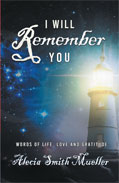
 |
I Will Remember You: Words of Life, Love and Gratitude
by Alecia Smith Mueller
Twenty20 Literary Group
Knowing you are there
Gives me peace
And calms my fears."
Evoking nautical images and composed of free verse, this short work is designed to be given as a gift of appreciation. It describes the journey of life as someone captaining their own ship. When there are storms and trouble, or when inspiration or guidance is needed, the captain knows to have faith that the lighthouse will appear. The lighthouse is the symbol representing the loved one or mentor who has been important in the life of the person giving the book. The beginning and end of the work evoke special feelings for the mentor and a belief in an ultimate spiritual mentor once the journey of life ends. The middle section is more focused on the gift-giver, or captain, and acknowledges that life is a journey with ups and downs and that only the captain is responsible for the choices made. To complete this book as a gift, the author has included a bookplate in the beginning that can be used to make a customized dedication.
There are several things that may come to the reader which can connect this book to other works. For example, there is a section where Mueller states, “Throughout my journey / I will sail, glide, chug, speed…” This clearly relates to a famous poem by Alfred Lord Tennyson titled “Ulysses.” This poem also uses a nautical theme and deals with the trials and tribulations in life. The poem closes with the lines, “To strive, to seek, to find, and not to yield.” In addition, there is another poem by a famous writer which also equates a lighthouse to a person who has been a steadfast supporter. Victor Hugo, in his poem “Jersey,” states, “Yon lighthouse stands forth like a fervent friend…” Historically, lighthouses have been metaphors for direction in life, safety, and navigation through life’s trials. Just as they are good for ships in the ocean, in literature, they stand as guides for those on the journey over the seas of existence. Considering the spiritual usage of light in the closing pages, pertaining to a light after death—“The light of Hope and Home,” as Mueller states—it is easy to be reminded of the well-known African American spiritual “This Little Light of Mine.” Both works evoke feelings of hope and reassurance. They can also be looked at as thematically linked to the verses in the Bible found in Matthew 5 and paralleled in Luke 11, about not hiding your light but letting it shine.
Mueller primarily writes free verse in plain language without grammatical errors. Occasionally, she uses a three-line stanza, sometimes repeated on the same page, with an aba rhyme pattern, also known as an enclosed tercet. She focuses her writing more on abstract concepts and themes than on detailed explanations of an event, utilizing a lot of metaphors. Someone looking for a last-minute gift for a favorite teacher or steadfast friend to let them know they made an impact could find this book the perfect present. It offers, through uplifting verse, the appreciation that the giver might be unable to express on their own.